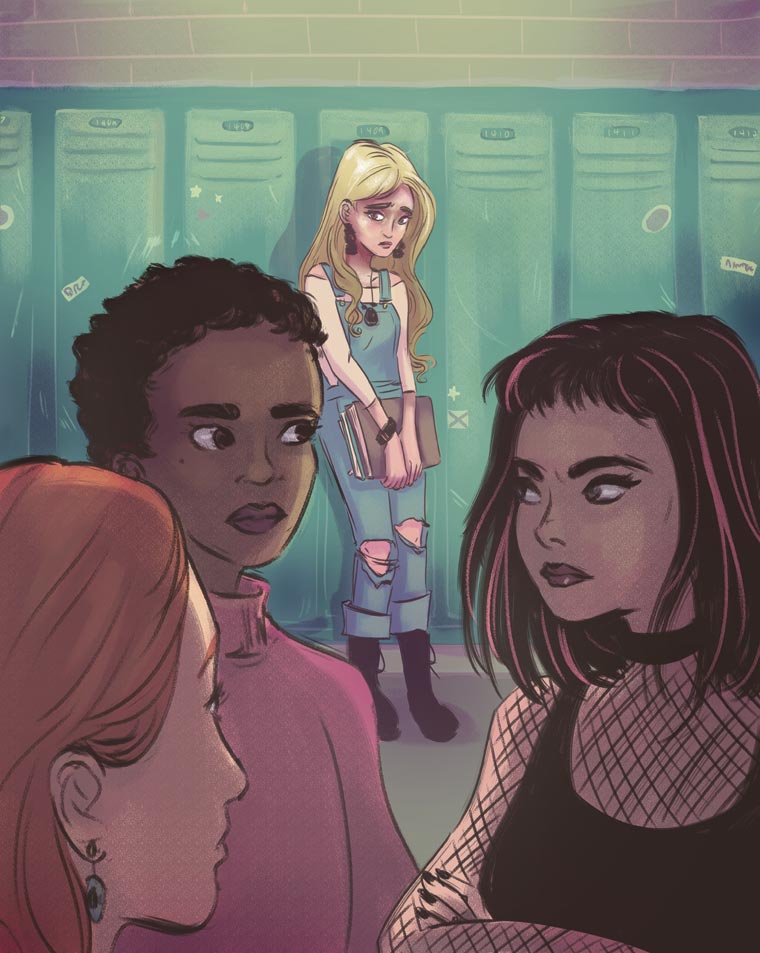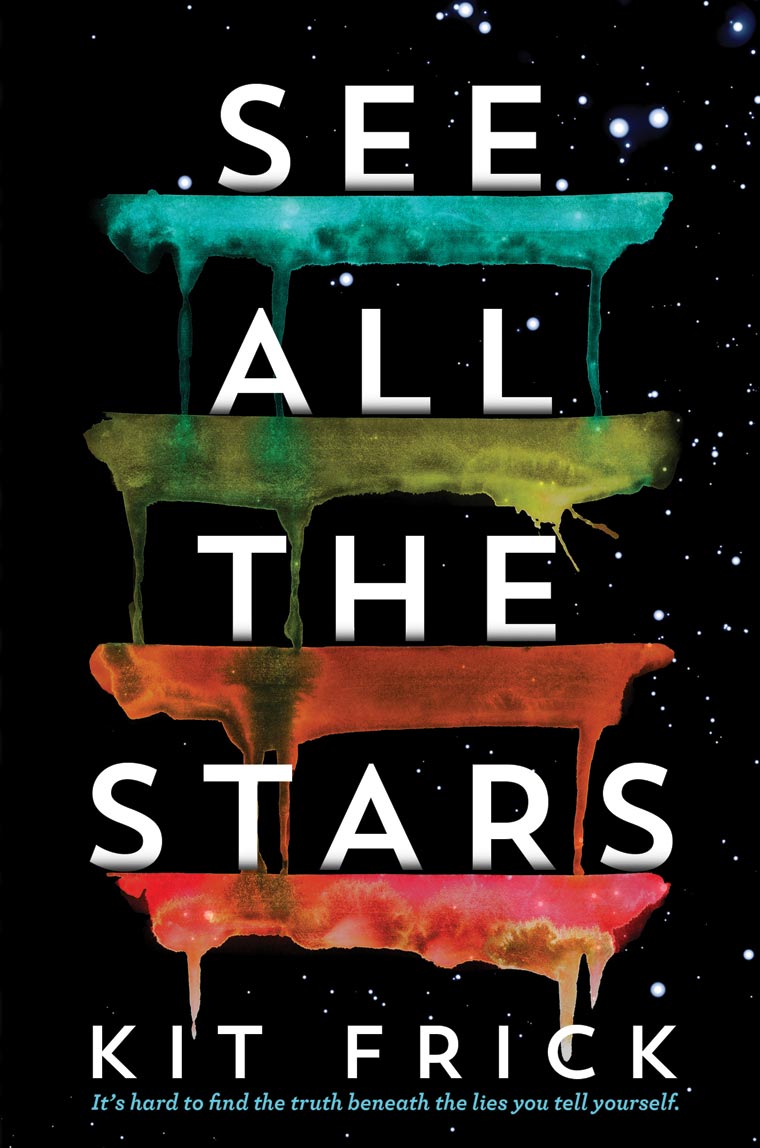Four best friends. One beautiful boy. A deception that ruined everything.
After a life-altering event tears apart her once-inseparable group of friends, Ellory returns to high school and faces up to the painful consequences of her past.

September, Senior Year
When we were in fifth grade, Maria Hidelman swore up and down that our elementary school was infested with mice—in the insulation and pipes, under the floors, lurking in the curled-up scroll of the projector screen—we just couldn’t see them. She said they came in through the vents at night, that mice could squeeze through the tiniest spaces because they had collapsible bones.
It was complete bullshit, of course. Her house had just been exterminated; the pest control guys were probably messing with her. It was way too easy to pull a fast one on prissy Maria Hidelman. But even now, years after freshman bio taught us that mice do not, in fact, come equipped with a collapsible skeleton, the image has stayed with me.
Collapsible bones. I sit in my seat in AP English, my long legs folded up as small as possible beneath the tiny desk. If I could have one superpower, that’s what it would be. The ability to fold myself in two, slink between tiny spaces, vanish inside walls.
The old Ellory wanted to be seen, known inside and out. I can feel my classmates’ eyes wash over me, wanting to get a good look. Ellory’s back. Now I feel too visible, on display, and it’s only day five of senior year.
I take a long, slow breath and remind myself that I chose this. I’m alone because I don’t deserve anything different. It was Ret’s fault first, and my fault last, and now I have to live with the consequences.
But now that I’m back at Pine Brook, totally exposed and no one to run to, I’m not sure I’m going to make it.
I glance up at the clock, careful to move only my eyes. It’s the game I’ve been playing in English this year. How many class minutes can Ellory get through without moving a muscle? It’s 2:26. Fourteen down, 34 to go. I tell myself I’m honing my listening skills. Who needs to take notes when your ears are tuned in to every word?
I can get through most of the day okay. I know these hallways. I have my routes. But whoever designed my senior year schedule, slotting English into eighth period, must be some kind of sadist. I am guaranteed to spend every hour of senior year dreading eighth, blazing bright at the end of the day like a house fire I just keep walking into.
I force my eyes to drop from the face of the clock straight down to the face of the girl at the desk directly across the room. She is the reason this class is such hell, but she’s also the reason I can’t leave. I refuse to give myself an easy out. Or her the satisfaction.
Ret. I’m prepared to look immediately away, but she doesn’t look up, doesn’t notice my eyes burning holes through her skin. She’s completely focused on the book open on the desk in front of her. With a shiny purple pen, she underlines some key passage, something meaningful only to her. If I let myself lean forward, even just a little, I could get a look at the page.
But I can’t.
I won’t.
We used to sit next to each other. We used to share books. Ret & Ellory. Ellory & Ret. We used to share everything. Now, eighth period is a daily reminder of English classes past. Ret and me passing notes, secret smart, laughing at the book nerds. Ret and me against the world.
Now she sits across from me, taunting me with her silence.
I force my eyes to drop from the face of the clock straight down to the face of the girl at the desk directly across the room. She is the reason this class is such hell, but she’s also the reason I can’t leave. I refuse to give myself an easy out.
My eyes wander over her ivory skin, her hair just brushing the tops of her shoulder blades. She’s let it get long over the summer. The glossy, black strands are streaked bubblegum pink, and her lips are coated in a faint, nude gloss. For Ret, it’s shockingly demure.
Before she can catch me looking, I tear my eyes away, feeling both like a trespasser and somehow violated at the same time. Dr. Marsha would say I need to stop fixating. I need to live in the present. In the present, Ret and I are not friends. In the present, we do not share secrets or books or long afternoons on Jenni’s front lawn. In the present, we’re moving on to chapter three. I’ll have to give up my game and turn the page in a minute.
I wait until the last possible second, until I’m sure Ms. Halim is going to ask me if I care to join the rest of the class, and then I reach in front of me and flip the page. My arm floats over the desk, weightless because it’s empty inside. Hollow.
As Ms. Halim draws our attention to the use of foreshadowing in the text, I close my eyes and a soft, deep voice fills up the dark. I think you’re beautiful. I can almost smell him—smoke from somebody else’s cigarettes, bar soap, mint. I can almost feel his arm slide around my waist, pull me close. I give my head a firm shake, no, forcing my eyes back open. I will not let myself do this. I do not have a boyfriend, this is not last year. I’m not that Ellory anymore. I may look the same on the outside, but like we’ve always been taught, it’s what’s inside that counts: Burned-up girl. Wasteland.
My eyes drift back to the clock. It’s 2:47, and the class is debating the merit of authorial intent. Ms. Halim suggests that critical analysis supersedes intentionality. Maria Hidelman is arguing, saying just to play devil’s advocate in her clipped, whiny voice, but she doesn’t have a case. Ms. Halim is so, so right. Best intentions, worst intentions. Planned, unplanned. All that matters about last spring is what went down. Who cares what I meant to happen, what I meant to say. Intentionality is so clearly meaningless when you run it up against the facts.
She doesn’t look up, doesn’t notice my eyes burning holes through her skin.
I keep my eyes fixed on the second hand for the next 13 minutes until the bell finally rings. My classmates are out the door with a squeal of chairs and a stampede of sneakers before I can even get my bag zipped up. I keep my head down and take my time. It’s Friday. They all have places to be, people to meet. I’m almost to the door when her hand closes around my wrist, digging my bracelet—our bracelet, the one I still wear—into my skin.
“Ellory May.”
I flinch. I didn’t see her hanging back, waiting for me. After a week of silence, Ret wants to talk. Has she been reading my thoughts, the ones that scream I can’t hack it alone?
“It’s not a good time,” I hiss.
Ms. Halim turns from the whiteboard where she’s erasing today’s key words. “Did you have a question, Ellory?” she asks.
I shake my head and drag Ret out of the classroom, into the hall. It’s clearing out fast like it always does after the dismissal bell rings, but there are still plenty of people around. People who will see us. I give my arm a shake, and she lets go. My wrist is sore where the bracelet pinched the skin, and I know she felt it too. How I still wear mine. How her wrist is bare.
“We can’t do this here.” My voice is barely a whisper. Whatever we have to say to each other, it’s no one else’s business.
She doesn’t say anything right away. Her hair smells like campfire and bleach. People are staring. I look away from the banging lockers and scuffling feet, right into Ret’s eyes. Bad move. I’m falling hard and fast; I can’t breathe.
“Meet me by the river,” Ret says, her voice low but clear, pulling me up for air. “The patch of bank where the guardrail’s missing.”
I know where she means. We used to go there sometimes freshman year, Ret and Jenni and me. You could scramble down the embankment toward the water, where no one could see you from the road. It was a hideaway right out in the open, and for a while it was ours. As soon as I got my license sophomore year—I was the oldest, the first—we packed into my car when we got the itch to explore. I haven’t been back to our spot by the river in years.
My mind spins back to the first time Ret took us there, a March afternoon that still felt more like winter than spring. She’d discovered it, of course, led us through the break in the guardrail like she was taking us to Narnia. Nestled into the tall grass along the bank, we all wrote our darkest secrets on sheets of notebook paper and folded them into swans to sail on the surface of the water. Ret said it would be like an act of absolution, a letting go. But before we could set them free, she stopped us. It only works if you read them out loud first.
She was playing with a stacked deck. She’d written something just incriminating enough, but still safe to share. Before we could stop her—and didn’t we want to know what she’d done?—she unfolded her paper and started to read. After my dad left, I made a list of all the ways my mom had driven him away. Then I left it on my dresser for her to find. I laughed after she read it, when she locked herself in her room and cried.
“That’s really low,” I’d said.
Ret tossed back her hair. “The split was my dad’s fault, 100 percent. But he wasn’t around, so I needed to take it out on someone. I was 10, sue me. Who’s next?"
Jenni and I balked, but Ret played hurt. She’d gone first after all, now we had to do it. Didn’t we trust her?
She was playing with a stacked deck. She’d written something just incriminating enough, but still safe to share. Before we could stop her—and didn’t we want to know what she’d done?—she unfolded her paper and started to read.
Jenni told a story from elementary school, how she’d gotten some kid—a nose-picker, an easy target—in trouble for something she’d done. It was bad, but not as bad as mine. I’d written my real feelings about Jenni: that I thought she tried too hard, how I put up with her for Ret’s sake.
I refused to read it, choosing Ret’s ridicule and Jenni’s scorn over the alternative. But somehow, Jenni knew. Whatever I’d written, she knew it was about her. The damage was done.
“I can’t,” I say to Ret, her expectant face drawing me back into the present. “Not today.” It’s tempting, but I’m not ready for whatever she wants to talk about. For whatever game she’s playing.
She’s quiet for a moment, shifting her bag against her shoulder and studying my face. “Okay, Ellory,” she says finally. “Some other time then. I’m there most days after school. Come find me.” Without waiting for my response, she takes off toward the nearest stairwell. I watch her retreat down the hall, her hair fluttering against the back of her neck in a fan of black and pink.
Alone again, I slump against the wall and close my eyes. I can feel my muscles let go, my body sliding down the cool paint like a marionette clipped from its strings. Somewhere down the hall, I hear a boy’s voice shout, “Better keep it together, Holland!” followed by a chorus of giggles and slamming locker doors. When the laughter dies down, I can almost swear I hear a softer voice say, “Leave her alone,” but that might be wishful thinking.
From the instant I saw her in class on the first day back, I knew. She could sense the cracks in my resolve. She knew I still needed her, after everything. Come find me. The echo of her words in my ears starts as an invitation that swiftly becomes a rush of river water, pummeling and loud, until all I can hear is the greedy, deafening roar.

Excerpted from the Young Adult Novel See All the Stars
By Kit Frick ’04
Illustration by Mina Price
Kit Frick ’04 is a novelist, poet, and MacDowell Colony fellow. Originally from Pittsburgh, Pennsylvania, she studied creative writing at Sarah Lawrence and earned her MFA at Syracuse University. She also holds an MA in higher education from NYU, where she worked for many years as an academic administrator before leaving to pursue her passion for writing and editing full time. When she isn’t putting complicated characters in impossible situations, Frick edits poetry and literary fiction for Black Lawrence Press (working with SLC classmate and executive editor Diane Goettel ’04) and edits for private clients through her practice, Copper Lantern Studio. See All the Stars is her debut novel.
© Kristin S. Frick 2018. Published by Margaret K. McElderry Books, Simon & Schuster, New York. Reprinted by permission of the publisher.
Author photo by Carly Gaebe ’04 / Steadfast Studio
